Ireland and New Zealand: A Comparison of Physiotherapy Standards
VerifiedAdded on 2023/06/08
|5
|1109
|490
Essay
AI Summary
This essay provides a comparative analysis of physiotherapy standards in Ireland and New Zealand, focusing on their respective codes of conduct and ethical guidelines. It highlights the similarities in their approaches, particularly concerning patient dignity, autonomy, and professional accountability. The essay references the Irish Society of Chartered Physiotherapists (ISCP) and the Physiotherapy Board of New Zealand, emphasizing the importance of ethical practice, continuous professional development, and evidence-based decision-making in both countries. By examining these standards, the essay concludes that while specific regulations may differ, the core principles guiding physiotherapy practice are largely aligned, aiming to promote high-quality care and positive patient outcomes.
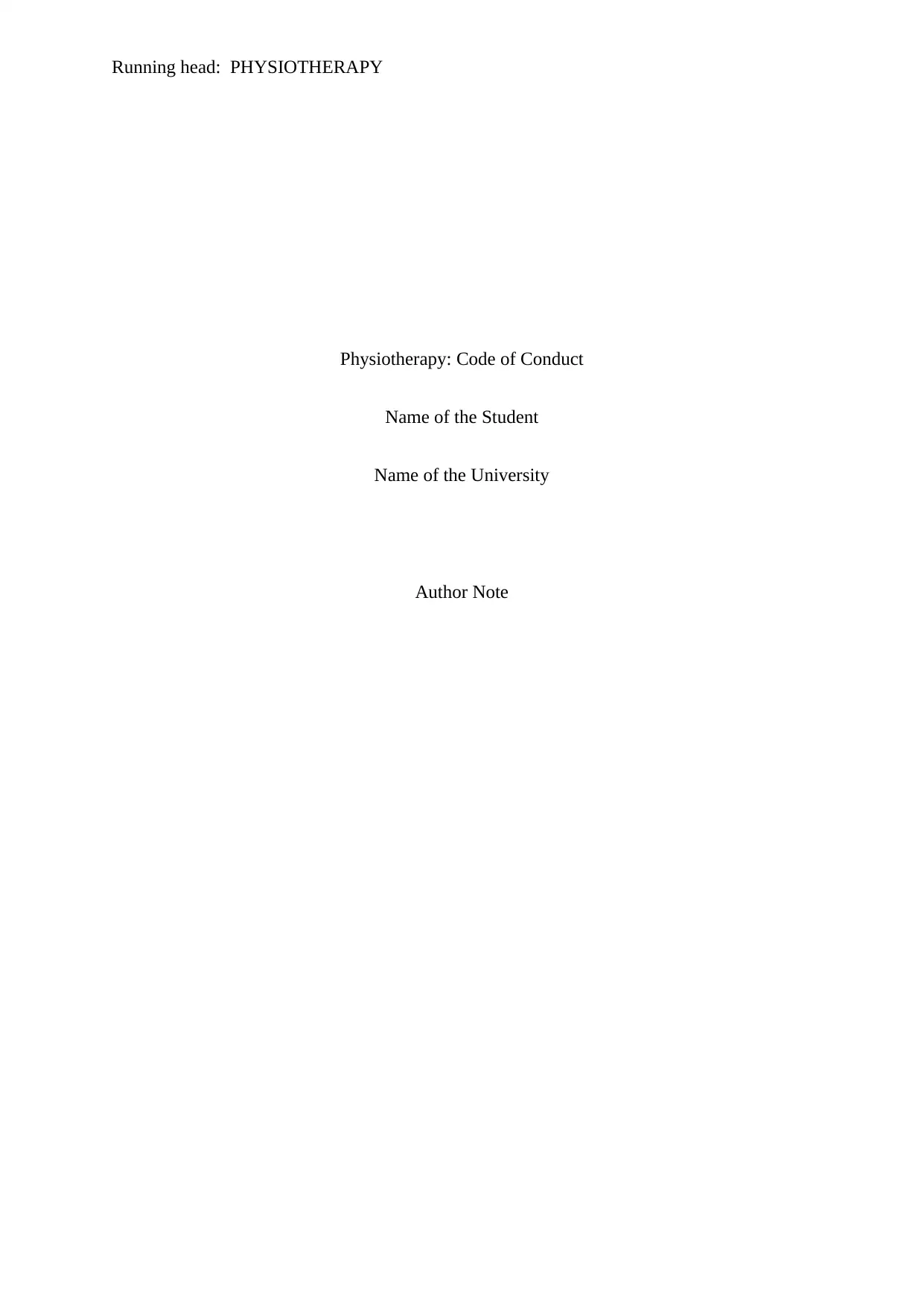
Running head: PHYSIOTHERAPY
Physiotherapy: Code of Conduct
Name of the Student
Name of the University
Author Note
Physiotherapy: Code of Conduct
Name of the Student
Name of the University
Author Note
Paraphrase This Document
Need a fresh take? Get an instant paraphrase of this document with our AI Paraphraser
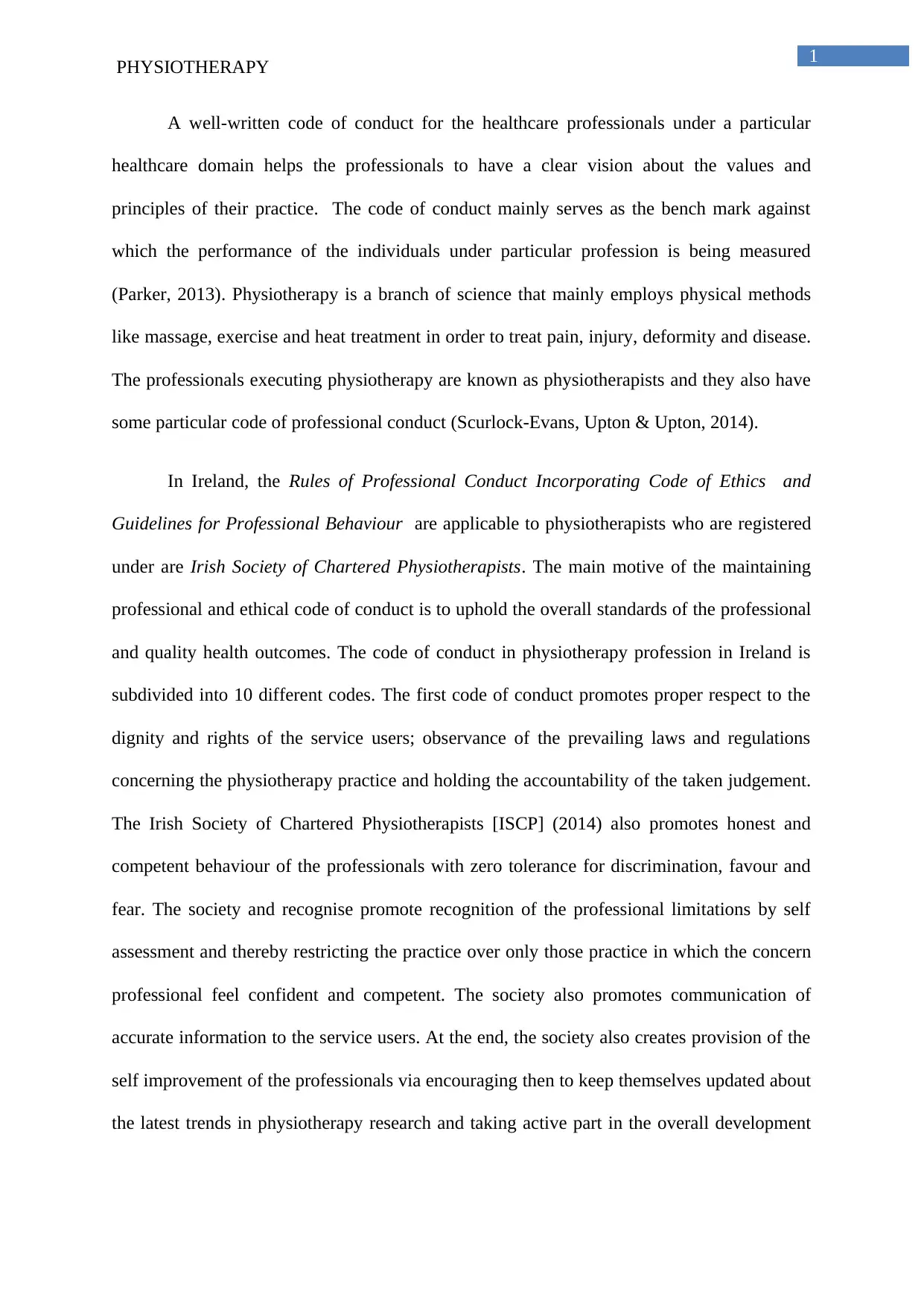
1
PHYSIOTHERAPY
A well-written code of conduct for the healthcare professionals under a particular
healthcare domain helps the professionals to have a clear vision about the values and
principles of their practice. The code of conduct mainly serves as the bench mark against
which the performance of the individuals under particular profession is being measured
(Parker, 2013). Physiotherapy is a branch of science that mainly employs physical methods
like massage, exercise and heat treatment in order to treat pain, injury, deformity and disease.
The professionals executing physiotherapy are known as physiotherapists and they also have
some particular code of professional conduct (Scurlock-Evans, Upton & Upton, 2014).
In Ireland, the Rules of Professional Conduct Incorporating Code of Ethics and
Guidelines for Professional Behaviour are applicable to physiotherapists who are registered
under are Irish Society of Chartered Physiotherapists. The main motive of the maintaining
professional and ethical code of conduct is to uphold the overall standards of the professional
and quality health outcomes. The code of conduct in physiotherapy profession in Ireland is
subdivided into 10 different codes. The first code of conduct promotes proper respect to the
dignity and rights of the service users; observance of the prevailing laws and regulations
concerning the physiotherapy practice and holding the accountability of the taken judgement.
The Irish Society of Chartered Physiotherapists [ISCP] (2014) also promotes honest and
competent behaviour of the professionals with zero tolerance for discrimination, favour and
fear. The society and recognise promote recognition of the professional limitations by self
assessment and thereby restricting the practice over only those practice in which the concern
professional feel confident and competent. The society also promotes communication of
accurate information to the service users. At the end, the society also creates provision of the
self improvement of the professionals via encouraging then to keep themselves updated about
the latest trends in physiotherapy research and taking active part in the overall development
PHYSIOTHERAPY
A well-written code of conduct for the healthcare professionals under a particular
healthcare domain helps the professionals to have a clear vision about the values and
principles of their practice. The code of conduct mainly serves as the bench mark against
which the performance of the individuals under particular profession is being measured
(Parker, 2013). Physiotherapy is a branch of science that mainly employs physical methods
like massage, exercise and heat treatment in order to treat pain, injury, deformity and disease.
The professionals executing physiotherapy are known as physiotherapists and they also have
some particular code of professional conduct (Scurlock-Evans, Upton & Upton, 2014).
In Ireland, the Rules of Professional Conduct Incorporating Code of Ethics and
Guidelines for Professional Behaviour are applicable to physiotherapists who are registered
under are Irish Society of Chartered Physiotherapists. The main motive of the maintaining
professional and ethical code of conduct is to uphold the overall standards of the professional
and quality health outcomes. The code of conduct in physiotherapy profession in Ireland is
subdivided into 10 different codes. The first code of conduct promotes proper respect to the
dignity and rights of the service users; observance of the prevailing laws and regulations
concerning the physiotherapy practice and holding the accountability of the taken judgement.
The Irish Society of Chartered Physiotherapists [ISCP] (2014) also promotes honest and
competent behaviour of the professionals with zero tolerance for discrimination, favour and
fear. The society and recognise promote recognition of the professional limitations by self
assessment and thereby restricting the practice over only those practice in which the concern
professional feel confident and competent. The society also promotes communication of
accurate information to the service users. At the end, the society also creates provision of the
self improvement of the professionals via encouraging then to keep themselves updated about
the latest trends in physiotherapy research and taking active part in the overall development
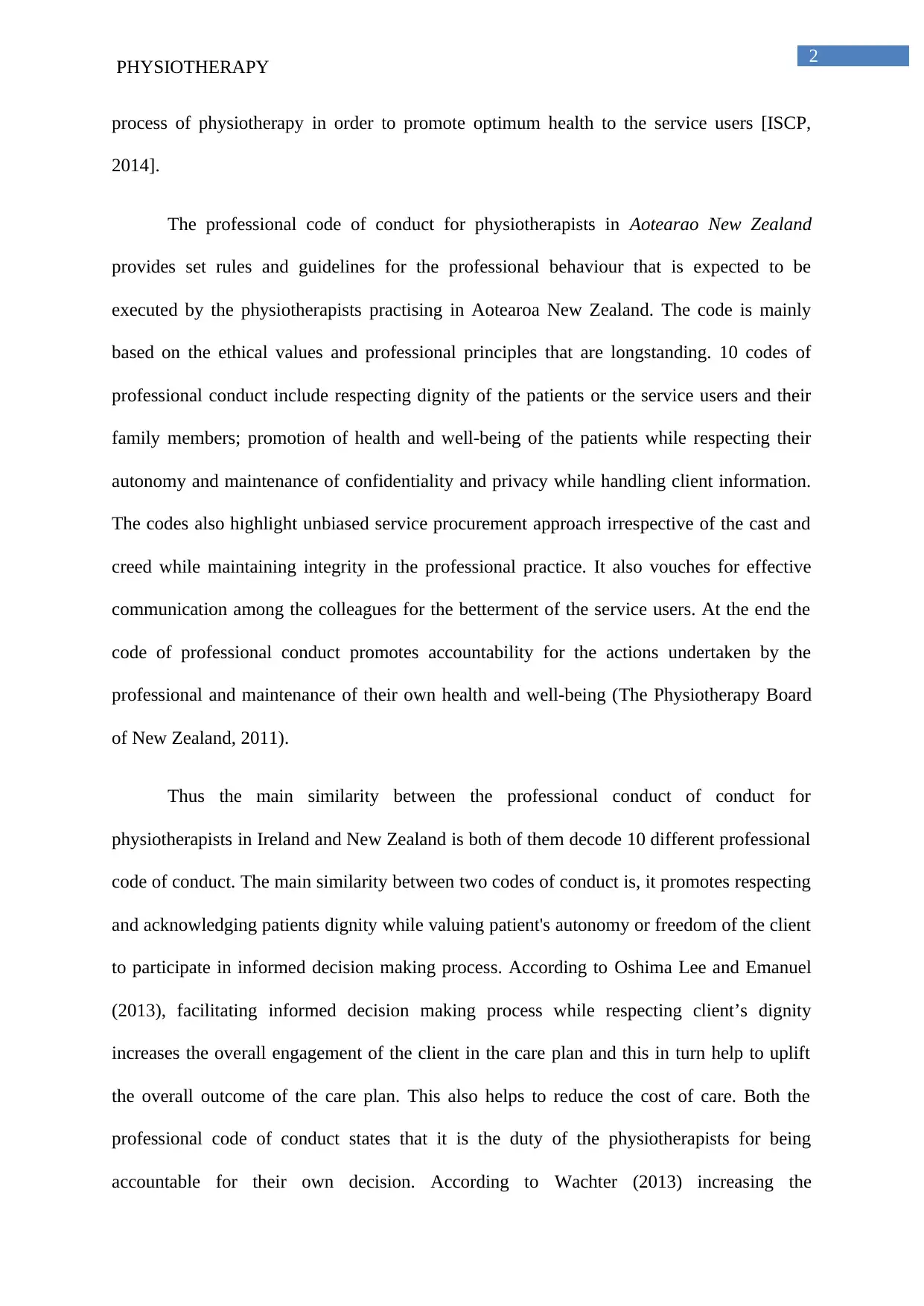
2
PHYSIOTHERAPY
process of physiotherapy in order to promote optimum health to the service users [ISCP,
2014].
The professional code of conduct for physiotherapists in Aotearao New Zealand
provides set rules and guidelines for the professional behaviour that is expected to be
executed by the physiotherapists practising in Aotearoa New Zealand. The code is mainly
based on the ethical values and professional principles that are longstanding. 10 codes of
professional conduct include respecting dignity of the patients or the service users and their
family members; promotion of health and well-being of the patients while respecting their
autonomy and maintenance of confidentiality and privacy while handling client information.
The codes also highlight unbiased service procurement approach irrespective of the cast and
creed while maintaining integrity in the professional practice. It also vouches for effective
communication among the colleagues for the betterment of the service users. At the end the
code of professional conduct promotes accountability for the actions undertaken by the
professional and maintenance of their own health and well-being (The Physiotherapy Board
of New Zealand, 2011).
Thus the main similarity between the professional conduct of conduct for
physiotherapists in Ireland and New Zealand is both of them decode 10 different professional
code of conduct. The main similarity between two codes of conduct is, it promotes respecting
and acknowledging patients dignity while valuing patient's autonomy or freedom of the client
to participate in informed decision making process. According to Oshima Lee and Emanuel
(2013), facilitating informed decision making process while respecting client’s dignity
increases the overall engagement of the client in the care plan and this in turn help to uplift
the overall outcome of the care plan. This also helps to reduce the cost of care. Both the
professional code of conduct states that it is the duty of the physiotherapists for being
accountable for their own decision. According to Wachter (2013) increasing the
PHYSIOTHERAPY
process of physiotherapy in order to promote optimum health to the service users [ISCP,
2014].
The professional code of conduct for physiotherapists in Aotearao New Zealand
provides set rules and guidelines for the professional behaviour that is expected to be
executed by the physiotherapists practising in Aotearoa New Zealand. The code is mainly
based on the ethical values and professional principles that are longstanding. 10 codes of
professional conduct include respecting dignity of the patients or the service users and their
family members; promotion of health and well-being of the patients while respecting their
autonomy and maintenance of confidentiality and privacy while handling client information.
The codes also highlight unbiased service procurement approach irrespective of the cast and
creed while maintaining integrity in the professional practice. It also vouches for effective
communication among the colleagues for the betterment of the service users. At the end the
code of professional conduct promotes accountability for the actions undertaken by the
professional and maintenance of their own health and well-being (The Physiotherapy Board
of New Zealand, 2011).
Thus the main similarity between the professional conduct of conduct for
physiotherapists in Ireland and New Zealand is both of them decode 10 different professional
code of conduct. The main similarity between two codes of conduct is, it promotes respecting
and acknowledging patients dignity while valuing patient's autonomy or freedom of the client
to participate in informed decision making process. According to Oshima Lee and Emanuel
(2013), facilitating informed decision making process while respecting client’s dignity
increases the overall engagement of the client in the care plan and this in turn help to uplift
the overall outcome of the care plan. This also helps to reduce the cost of care. Both the
professional code of conduct states that it is the duty of the physiotherapists for being
accountable for their own decision. According to Wachter (2013) increasing the
⊘ This is a preview!⊘
Do you want full access?
Subscribe today to unlock all pages.

Trusted by 1+ million students worldwide
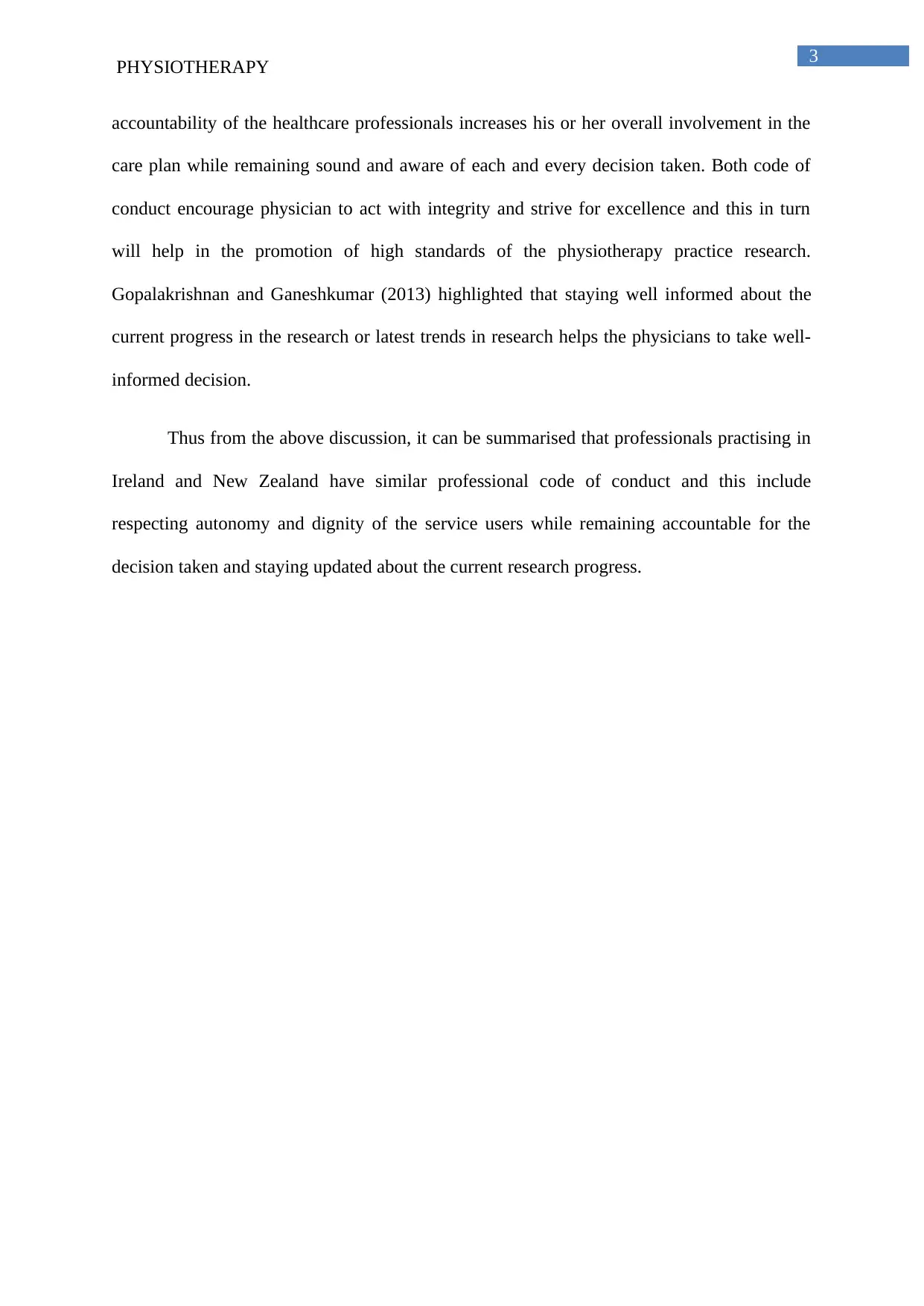
3
PHYSIOTHERAPY
accountability of the healthcare professionals increases his or her overall involvement in the
care plan while remaining sound and aware of each and every decision taken. Both code of
conduct encourage physician to act with integrity and strive for excellence and this in turn
will help in the promotion of high standards of the physiotherapy practice research.
Gopalakrishnan and Ganeshkumar (2013) highlighted that staying well informed about the
current progress in the research or latest trends in research helps the physicians to take well-
informed decision.
Thus from the above discussion, it can be summarised that professionals practising in
Ireland and New Zealand have similar professional code of conduct and this include
respecting autonomy and dignity of the service users while remaining accountable for the
decision taken and staying updated about the current research progress.
PHYSIOTHERAPY
accountability of the healthcare professionals increases his or her overall involvement in the
care plan while remaining sound and aware of each and every decision taken. Both code of
conduct encourage physician to act with integrity and strive for excellence and this in turn
will help in the promotion of high standards of the physiotherapy practice research.
Gopalakrishnan and Ganeshkumar (2013) highlighted that staying well informed about the
current progress in the research or latest trends in research helps the physicians to take well-
informed decision.
Thus from the above discussion, it can be summarised that professionals practising in
Ireland and New Zealand have similar professional code of conduct and this include
respecting autonomy and dignity of the service users while remaining accountable for the
decision taken and staying updated about the current research progress.
Paraphrase This Document
Need a fresh take? Get an instant paraphrase of this document with our AI Paraphraser
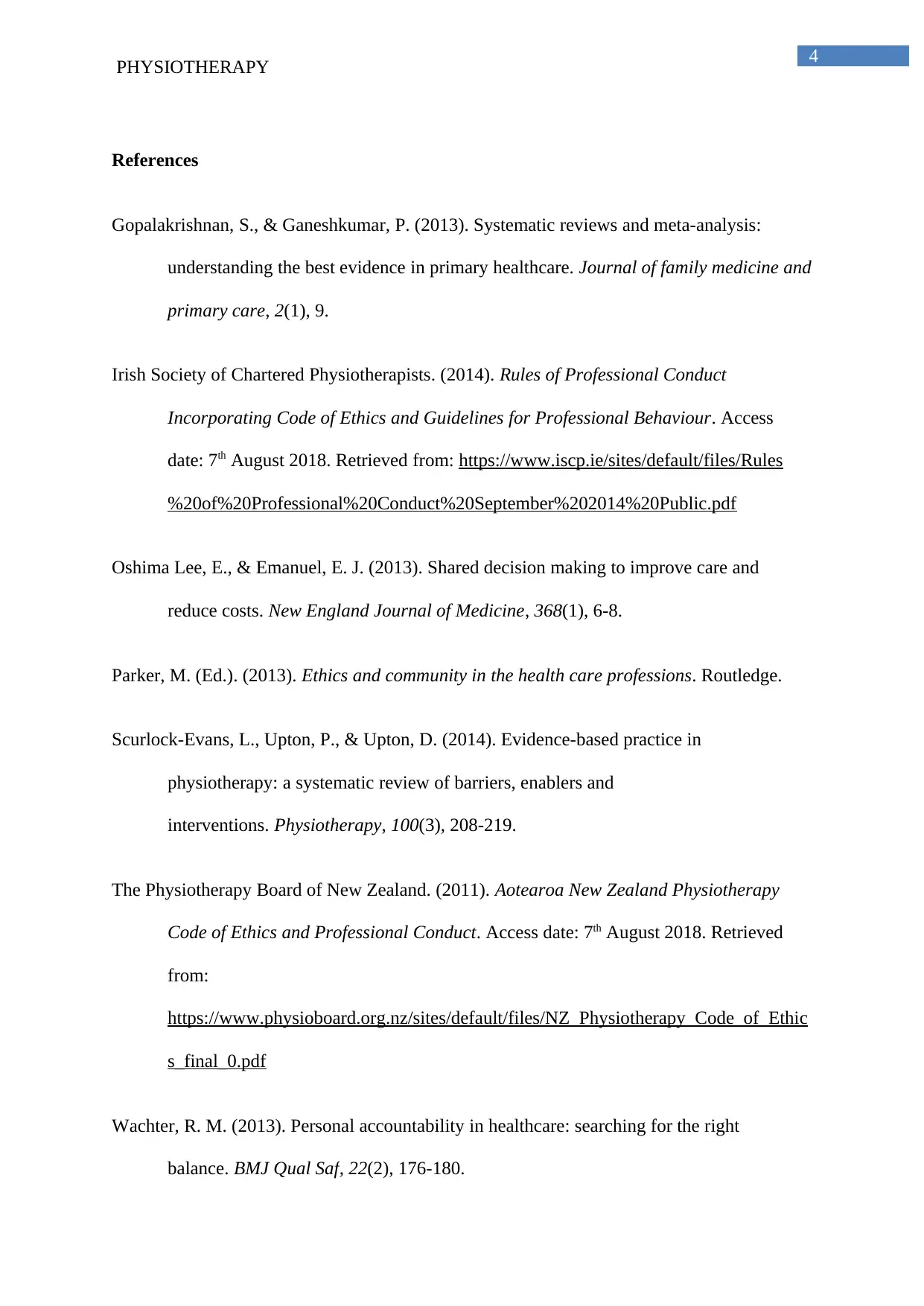
4
PHYSIOTHERAPY
References
Gopalakrishnan, S., & Ganeshkumar, P. (2013). Systematic reviews and meta-analysis:
understanding the best evidence in primary healthcare. Journal of family medicine and
primary care, 2(1), 9.
Irish Society of Chartered Physiotherapists. (2014). Rules of Professional Conduct
Incorporating Code of Ethics and Guidelines for Professional Behaviour. Access
date: 7th August 2018. Retrieved from: https://www.iscp.ie/sites/default/files/Rules
%20of%20Professional%20Conduct%20September%202014%20Public.pdf
Oshima Lee, E., & Emanuel, E. J. (2013). Shared decision making to improve care and
reduce costs. New England Journal of Medicine, 368(1), 6-8.
Parker, M. (Ed.). (2013). Ethics and community in the health care professions. Routledge.
Scurlock-Evans, L., Upton, P., & Upton, D. (2014). Evidence-based practice in
physiotherapy: a systematic review of barriers, enablers and
interventions. Physiotherapy, 100(3), 208-219.
The Physiotherapy Board of New Zealand. (2011). Aotearoa New Zealand Physiotherapy
Code of Ethics and Professional Conduct. Access date: 7th August 2018. Retrieved
from:
https://www.physioboard.org.nz/sites/default/files/NZ_Physiotherapy_Code_of_Ethic
s_final_0.pdf
Wachter, R. M. (2013). Personal accountability in healthcare: searching for the right
balance. BMJ Qual Saf, 22(2), 176-180.
PHYSIOTHERAPY
References
Gopalakrishnan, S., & Ganeshkumar, P. (2013). Systematic reviews and meta-analysis:
understanding the best evidence in primary healthcare. Journal of family medicine and
primary care, 2(1), 9.
Irish Society of Chartered Physiotherapists. (2014). Rules of Professional Conduct
Incorporating Code of Ethics and Guidelines for Professional Behaviour. Access
date: 7th August 2018. Retrieved from: https://www.iscp.ie/sites/default/files/Rules
%20of%20Professional%20Conduct%20September%202014%20Public.pdf
Oshima Lee, E., & Emanuel, E. J. (2013). Shared decision making to improve care and
reduce costs. New England Journal of Medicine, 368(1), 6-8.
Parker, M. (Ed.). (2013). Ethics and community in the health care professions. Routledge.
Scurlock-Evans, L., Upton, P., & Upton, D. (2014). Evidence-based practice in
physiotherapy: a systematic review of barriers, enablers and
interventions. Physiotherapy, 100(3), 208-219.
The Physiotherapy Board of New Zealand. (2011). Aotearoa New Zealand Physiotherapy
Code of Ethics and Professional Conduct. Access date: 7th August 2018. Retrieved
from:
https://www.physioboard.org.nz/sites/default/files/NZ_Physiotherapy_Code_of_Ethic
s_final_0.pdf
Wachter, R. M. (2013). Personal accountability in healthcare: searching for the right
balance. BMJ Qual Saf, 22(2), 176-180.
1 out of 5
Related Documents
Your All-in-One AI-Powered Toolkit for Academic Success.
+13062052269
info@desklib.com
Available 24*7 on WhatsApp / Email
![[object Object]](/_next/static/media/star-bottom.7253800d.svg)
Unlock your academic potential
Copyright © 2020–2025 A2Z Services. All Rights Reserved. Developed and managed by ZUCOL.





